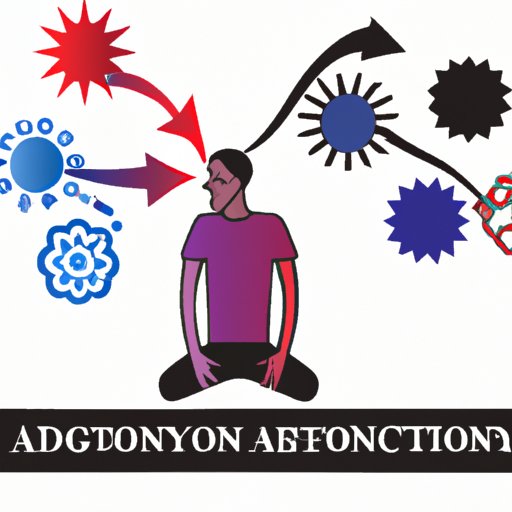Introduction: What is Addiction?
Addiction is a complex disorder that affects millions of people around the world. It is characterized by compulsive behaviors and an inability to control impulses despite potential negative consequences. While it is often associated with substance use disorders, addiction can also include behaviors such as gambling, shopping, or internet use. In order to better understand addiction, it is important to explore the various factors that can contribute to its development.
Exploring the Neurobiology of Addiction
The neurobiology of addiction refers to how addiction affects the brain and the role of neurotransmitters in addiction. Research has shown that addiction changes both the structure and function of the brain, resulting in long-term alterations in behavior and decision making. The reward system in the brain is particularly affected, leading to a cycle of reward-seeking behavior and craving for the substance or activity.
When someone is addicted to a substance or activity, their brain releases dopamine, which is the neurotransmitter responsible for pleasure and reward. This dopamine rush reinforces the addictive behavior and creates a powerful motivation to seek out the substance or activity again. Over time, the brain becomes accustomed to the dopamine surge, leading to tolerance and the need for more of the substance or activity in order to get the same effect.
Researchers have also found that certain genetic variations can influence how susceptible someone is to addiction. For example, individuals with a specific variation of the dopamine receptor gene are more likely to become addicted to drugs or alcohol than those without the variation. Furthermore, these genetic variations can increase the risk of developing an addiction even in individuals who have never used substances before.

Examining the Genetics of Addiction
What role does genetics play in addiction? Studies have shown that there is a strong hereditary component to addiction, meaning that someone’s risk for developing an addiction is higher if they have a family history of addiction. This is due to genetic variations that can increase the likelihood of becoming addicted to a substance or activity.
These variations can affect how the brain processes dopamine and other neurotransmitters, leading to changes in behavior and decision making. They can also affect how quickly someone develops tolerance to a substance or activity, leading to increased cravings and the need for more in order to get the same effect.
In addition, genetic variations can influence how susceptible someone is to environmental factors such as stress and trauma. These environmental factors can trigger addiction in individuals who may not have been predisposed to it otherwise.

Investigating the Psychology of Addiction
The psychology of addiction refers to how mental health disorders, cognitive distortions, and stressors can lead to addiction. Mental health disorders such as depression and anxiety can increase the likelihood of developing an addiction, as can cognitive distortions such as black and white thinking and catastrophizing. Stressful life events such as the death of a loved one or a job loss can also be triggers for addiction.
Research has also shown that trauma can play a role in addiction. Traumatic experiences can cause lasting changes in the brain, resulting in increased sensitivity to stress and the need to self-medicate in order to cope. Individuals who have experienced trauma may turn to drugs or alcohol in order to numb the pain or escape from reality.

Analyzing the Environmental Factors of Addiction
The environmental factors of addiction refer to how access to drugs and alcohol, social influences, and peer pressure can contribute to addiction. Accessibility is a key factor in the development of addiction, as those who have easier access to drugs and alcohol are more likely to develop an addiction. Social influences such as friends and family members who use drugs or alcohol can also increase the risk of addiction.
Peer pressure is another factor, as individuals may feel pressured to use drugs or alcohol in order to fit in with a particular group. Finally, poverty and other socioeconomic factors can increase the risk of addiction, as those living in poverty are more likely to have access to drugs and alcohol and less likely to receive adequate treatment and support.
Understanding the Social Impact of Addiction
Addiction not only affects the individual but also those around them. Family dynamics can be disrupted when one member is struggling with addiction, and relationships can suffer as trust is broken and communication is strained. On a larger scale, addiction can have a significant impact on society, resulting in increased crime, health care costs, and lost productivity.
The economic costs of addiction can be immense, as addiction leads to increased health care costs, lost work days, and decreased productivity. According to the National Institute on Drug Abuse, the total cost of substance abuse in the United States in 2018 was $740 billion dollars.
Examining the Role of Medication in Treating Addiction
Medication can be an effective tool in treating addiction, though it should always be used in conjunction with therapy and other forms of support. Medications such as buprenorphine and methadone can help reduce cravings and manage withdrawal symptoms, while naltrexone can block the effects of opioids and alcohol.
It is important to remember, however, that medication is not a cure-all for addiction. While it can help manage withdrawal symptoms and reduce cravings, it is still important to address the underlying causes of addiction in order to achieve lasting recovery.
Conclusion
Addiction is a complex disorder that affects the brain, body, and behavior. It is influenced by a variety of factors, including neurobiology, genetics, psychology, and environment. Understanding the different factors that contribute to addiction can help individuals and families better approach treatment and recovery.
Medication can be an effective tool in treating addiction, but it is important to remember that it is not a cure-all. Recovery requires addressing the underlying causes of addiction and making lifestyle changes that support long-term sobriety. For those struggling with addiction, there is hope. With the right treatment and support, recovery is possible.
(Note: Is this article not meeting your expectations? Do you have knowledge or insights to share? Unlock new opportunities and expand your reach by joining our authors team. Click Registration to join us and share your expertise with our readers.)
